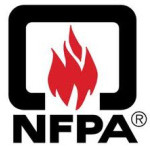- 産業: Fire safety
- Number of terms: 98780
- Number of blossaries: 0
- Company Profile:
Established in 1896, NFPA's mission is to reduce the worldwide burden of fire and other hazards on the quality of life by providing and advocating consensus codes and standards, research, training, and education.
The scientific designation of a chemical in accordance with the nomenclature system developed by the International Union of Pure and Applied Chemistry or the Chemical Abstracts Service rules of nomenclature, or a name that clearly identifies a chemical for the purpose of conducting an evaluation.
Industry:Fire safety
The procedure used in starting up a special atmosphere furnace to replace air within the heating chamber(s) and vestibule(s) with flammable special atmosphere.
Industry:Fire safety
The process of (1) purging, supplying an enclosure with a protective gas at a sufficient flow and positive pressure to reduce the concentration of any flammable gas or vapor initially present to an acceptable level; and (2) pressurization, supplying an enclosure with a protective gas with or without continuous flow at sufficient pressure to prevent the entrance of a flammable gas or vapor, a combustible dust, or an ignitible fiber.
Industry:Fire safety
The range of concentrations between the lower and upper flammable limits.
Industry:Fire safety
The principle of using an air sample drawn from the protected area into a high-humidity chamber combined with a lowering of chamber pressure to create an environment in which the resultant moisture in the air condenses on any smoke particles present, forming a cloud. The cloud density is measured by a photoelectric principle. The density signal is processed and used to convey an alarm condition when it meets preset criteria.
Industry:Fire safety
The plane extending between lines on each side of the vehicle that connect a point that is 8 in. (203 mm) above the ground on the vertical centerline of the rearmost wheel spindle to the lowest point on the intersection of the rear wall and floor lines.
Industry:Fire safety
The reflection of light in which the reflected rays are preferentially returned in the direction close to the opposite of the direction of the incident rays, with this property being maintained over wide variations of the direction of the incident rays.
Industry:Fire safety
The product of the flame spread factor (Fs) and the heat evolution factor (Qs), as determined in ASTM E 162.
Industry:Fire safety
The rate of flame propagation relative to the velocity of the unburned gas that is ahead of it.
Industry:Fire safety
The quantity of agent determined from the agent minimum design quantity as adjusted to account for design factors and pressure adjustment.
Industry:Fire safety
